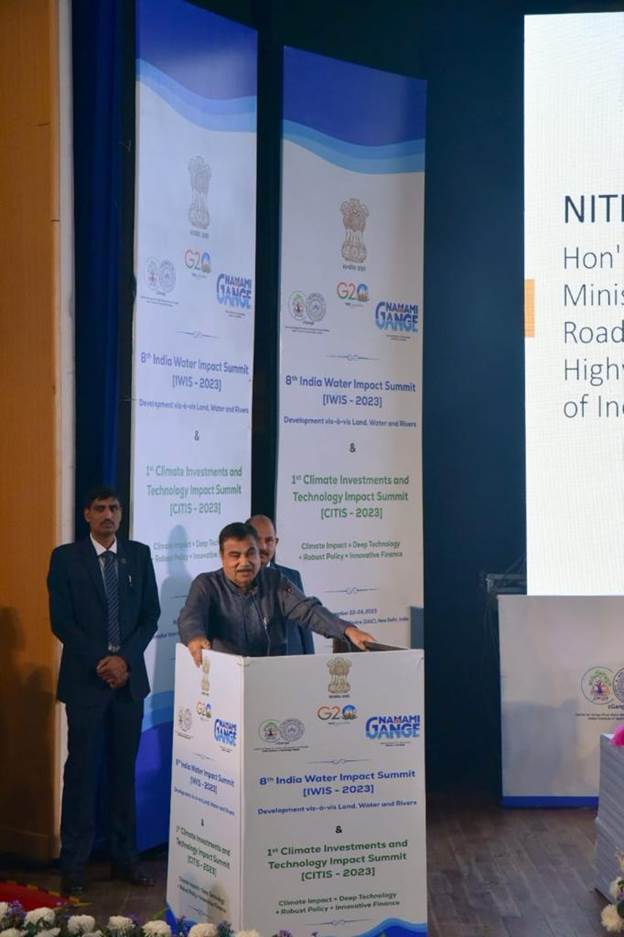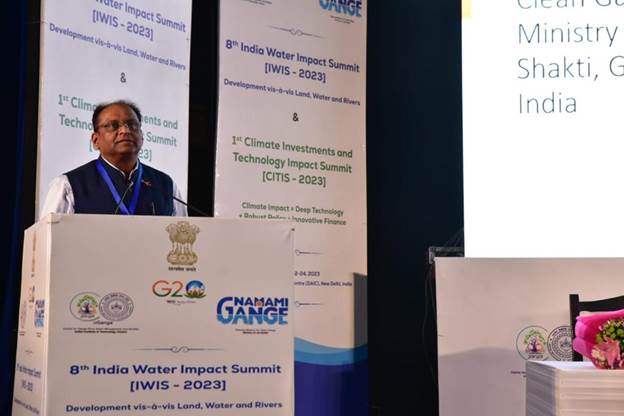New Delhi,23rd November: Shri Nitin Gadkari, the Union Minister of Road Transport and Highways of India, inaugurated the 8th Edition of the India Water Impact Summit (IWIS) on November 22, 2023, at the Dr Ambedkar International Centre in New Delhi. The summit, organized by the National Mission for Clean Ganga (NMCG) and the Center for Ganga River Basin Management and Studies (cGanga), spans three days from November 22 to 24, 2023.
The theme of IWIS 2023 is ‘Development vis-à-vis Land, Water and Rivers,’ aimed at uniting scientific experts, stakeholders, and government representatives to address dynamic challenges and opportunities in India’s water sector.

Among the distinguished speakers were Ms Debashree Mukherjee, Secretary, DoWR, RD & GR, Shri G. Asok Kumar, DG-NMCG, Shri Igor Papič, Minister of Science, Technology, and Innovation from the Republic of Slovenia, Dr. Vinod Tare, Founding head of cGanga and Professor at IIT Kanpur, and Shri Sanmit Ahuja (cGanga).

The Union Minister of Ministry of Roads, Transport and Highways, Shri Nitin Gadkari, delivered a compelling address highlighting three pivotal pillars of society—ethics, ecology and environment, and economics—underscoring their integral role in shaping a sustainable future. He emphasized the importance of ecological initiatives, stressing that good experiments and technology are readily available. He outlined two significant philosophies for the future—conversion of knowledge into wealth through innovation, entrepreneurship, science, technology, research skills, and successful management practices, and the conversion of waste into wealth, promoting the idea that no material or person is waste. Addressing scientists, Union Minister urged them to focus on proven technologies, economic viability, availability of raw materials, and marketability of finished products. He provided examples, such as the potential development of the Zuari river in Goa, where a large gallery is being constructed that will boost tourism and generate revenue.

Igor Papič, the Minister of Science, Technology, and Innovation from the Republic of Slovenia, advocated for a holistic approach to technology development for societal benefit. He highlighted the critical need to incorporate social science and humanities to address potential misuse cases, advocating for the active participation of the entire society in tech development. Recognizing water management as a complex problem demanding new technological innovation, he underscored the significance of water as a fundamental natural resource. He emphasized its pivotal role in the sustainable management of society, influencing both environmental and social aspects. Shri Papič drew attention to the global challenges facing the world—climate change, water scarcity, and biodiversity loss.
In addressing the complex challenges of water security in India, Ms Debashree Mukherjee, Secretary -Department of Water Resources, River Development, and Ganga Rejuvenation, highlighted key issues and strategies within water security and management. She said that the government has made substantial investments in drinking water and sanitation through flagship programs like the Jal Jeevan Mission and Swachh Bharat Mission. “However, sustaining these investments poses a significant challenge, especially given that 60% of the drinking water systems established by the Jal Jeevan Mission rely on groundwater”, she added. Climate change exacerbates these issues, impacting the water cycle with extreme precipitation and prolonged dry spells in various regions. To address these challenges, Ms Mukherjee outlined three key areas of focus. Firstly, efforts to improve river health to ensure rivers can sustain riverine systems, provide water for irrigation and drinking, and support the economy. Secondly, there is a focus on enhancing water use efficiency in agriculture. Thirdly, managing storage involves not only dams and reservoirs but also sedimentation management and local-level storage, such as ponds, pokhars, and groundwater.
Addressing the distinguished audience at the annual summit, Shri G. Asok Kumar, the Director General -National Mission for Clean Ganga (NMCG), reiterated Namami Gange’s unwavering commitment to its mandate over the years. He said that NMCG has steadfastly delivered on its mandate, focusing on cleaning and rejuvenating the Ganga and its tributaries. Shri G. Asok Kumar emphasized the invaluable lessons learned from NMCG’s implementation strategies, which are now becoming guiding principles for other cities facing similar challenges.

Reflecting on the environmental changes witnessed over the last century, including increased pollution, industrialization, and urbanization leading to the degradation of rivers and the drying up of streams, Shri G. Asok Kumar highlighted the Ganga’s unique significance as the holiest of rivers. In response, NMCG launched a concentrated effort to rejuvenate the Ganga with a committed budget of 40 thousand crores. Shri G. Asok Kumar’s address emphasized NMCG’s role as a torchbearer in the comprehensive rejuvenation of rivers. The Namami Gange’s dedication and lessons learned from its initiatives are now serving as a blueprint for other regions grappling with similar environmental challenges.
With United Nations recognition on December 13, 2022, marking a momentous occasion for the organization, Shri Kumar said that it is a testament to NMCG’s unwavering commitment and successful delivery of its mandated objectives over the years. He added that NMCG’s dedication to the cause of cleaning and revitalizing rivers has been executed with precision. The organization has implemented advanced technologies, ensuring that treated water does not seep into rivers. Furthermore, he said that this achievement is a result of NMCG’s innovative River Basin Management Plan, guided by the principles of Nirmal (clean), Aviral (continuous flow), Gyan (knowledge), and Jan (public participation). In 2019, the Prime Minister Shri Narendra Modi introduced a new pillar, Arth Ganga, underlining the need to connect rivers and people through economic bridges. Shri Kumar said that this addition transformed NMCG from a pure river management program into a comprehensive river-people connect initiative.
With the MoU signed by former President of India Shri Ram Nath Kovind with the Republic of Slovenia in 2019, NMCG entered into a partnership aimed at facilitating flood mapping and other technical endeavors within the Ganga basin, bringing together expertise from both nations to address complex challenges in river management. Shri Kumar said that NMCG’s endeavors in expanding its reach to the tributaries and forging international collaborations exemplify its commitment to adopting innovative and effective strategies.
Dr Vinod Tare, Founding head of cGanga and Professor at IIT Kanpur, spoke at length about the origin and the visionary objectives of the summit that has continued to evolve over the years. Dr Tare emphasized the concept of Samarth Ganga, illustrating the river’s inherent ability to remain intact and serve humanity. He advocated for the preservation of the river’s flow, introducing the term Aviral Ganga, emphasizing the need to leave some water for the river’s well-being. Underlining the success of these initiatives, Dr Tare informed that the Government of India has now embarked on projects to address water challenges in other river basins, including Narmada, Kaveri, and Mandakini. These projects, backed by a high critical mass, signal a promising future for sustainable water management.
In a momentous prelude to the International Water Innovation Summit 2023 (IWIS) and the 1st CITIS Summit, a special session titled “River Cities Alliance – A Global Step Forward (GRCA) was also held and was attended by delegates from Ethiopia, Denmark, Mexico, the Federal Republic of Germany, Bhutan, United Kingdom, Nepal and Japan. Addressing the session, Shri G. Asok Kumar, DG-NMCG, announced the upcoming launch of the Global River Cities Alliance (GRCA) in COP28 on December 10, 2023, in Dubai. He emphasized the collaborative initiative’s global mission to unite cities and leverage joint efforts for transforming rivers into catalysts for urban water management. He highlighted NMCG’s significant achievements in pollution abatement, effective river basin management, and the enhancement of people-river connectivity and biodiversity in the Ganga. Recognizing the Ganga’s cultural significance as a lifeline for 40% of India’s population, Shri Kumar underscored NMCG’s pivotal role in cultural preservation and ecological restoration. He outlined NMCG’s recent efforts, expanding collaborative initiatives to 140 rivers, and highlighted the launch of the Global Cities Alliance, signaling a strategic move towards a more sustainable future. He emphasized the government’s commitment to address urban water challenges through initiatives like Catch the Rain and the Urban River Management Plan, aiming to rejuvenate water bodies and improve water quality.
Day 1 of IWIS 2023 also held sessions on ‘Samarth Ganga and Productive Land- I’ and “Lifetsyle for & Economics of Rivers-I.
Concurrently, Day 1 of CITIS, technology pitches were presented to the evaluation panel, complemented by the inauguration and walkthrough of the exhibition. Notably, the Jalaj Stall emerged as a central attraction, capturing the attention and enthusiasm of attendees keen to explore innovative water solutions. The exhibition, situated on the sidelines of IWIS and CITIS, featured disruptive, high-impact innovative solutions spanning various sectors, including water, energy, waste, food, agriculture, and transport.

Comments are closed.